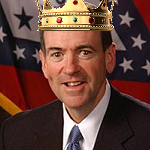Romney v Clinton?
Re: Romney v Clinton?
Lol
go ahead. keep screaming "Shut The f**k Up " at me. it only makes my opinions Worse
-

Philly - Governor
- Posts: 9899
- Joined: Sat Feb 22, 2014 6:36 pm
- Gender:

- Has thanked: 975 times
- Been thanked: 1223 times
- Political Leaning: DEMOCRATIC SOCIALIST
-

Mr. Shaman - Senator
- Posts: 1858
- Joined: Sat Apr 19, 2014 10:22 am
- Gender:

- Has thanked: 0 time
- Been thanked: 93 times
- Political Leaning: Progressive
Re: Romney v Clinton?
Yeah but that's still Obama's fault because leadership or something
go ahead. keep screaming "Shut The f**k Up " at me. it only makes my opinions Worse
-

Philly - Governor
- Posts: 9899
- Joined: Sat Feb 22, 2014 6:36 pm
- Gender:

- Has thanked: 975 times
- Been thanked: 1223 times
- Political Leaning: DEMOCRATIC SOCIALIST
Re: Romney v Clinton?
WASHINGTON -- As President Barack Obama was celebrating his inauguration at various balls, top Republican lawmakers and strategists were conjuring up ways to submarine his presidency at a private dinner in Washington.
The event -- which provides a telling revelation for how quickly the post-election climate soured -- serves as the prologue of Robert Draper's much-discussed and heavily-reported new book, "Do Not Ask What Good We Do: Inside the U.S. House of Representatives."
According to Draper, the guest list that night (which was just over 15 people in total) included Republican Reps. Eric Cantor (Va.), Kevin McCarthy (Calif.), Paul Ryan (Wis.), Pete Sessions (Texas), Jeb Hensarling (Texas), Pete Hoekstra (Mich.) and Dan Lungren (Calif.), along with Republican Sens. Jim DeMint (S.C.), Jon Kyl (Ariz.), Tom Coburn (Okla.), John Ensign (Nev.) and Bob Corker (Tenn.). The non-lawmakers present included Newt Gingrich, several years removed from his presidential campaign, and Frank Luntz, the long-time Republican wordsmith. Notably absent were Senate Minority Leader Mitch McConnell (R-Ky.) and House Minority Leader John Boehner (R-Ohio) -- who, Draper writes, had an acrimonious relationship with Luntz.
For several hours in the Caucus Room (a high-end D.C. establishment), the book says they plotted out ways to not just win back political power, but to also put the brakes on Obama's legislative platform.
"If you act like you're the minority, you're going to stay in the minority," Draper quotes McCarthy as saying. "We've gotta challenge them on every single bill and challenge them on every single campaign."
The conversation got only more specific from there, Draper reports. Kyl suggested going after incoming Treasury Secretary Timothy Geithner for failing to pay Social Security and Medicare taxes while at the International Monetary Fund. Gingrich noted that House Ways and Means Chairman Charlie Rangel (D-N.Y.) had a similar tax problem. McCarthy chimed in to declare "there's a web" before arguing that Republicans could put pressure on any Democrat who accepted campaign money from Rangel to give it back.
The dinner lasted nearly four hours. They parted company almost giddily. The Republicans had agreed on a way forward:
Go after Geithner. (And indeed Kyl did, the next day: ‘Would you answer my question rather than dancing around it—please?’)
Show united and unyielding opposition to the president’s economic policies. (Eight days later, Minority Whip Cantor would hold the House Republicans to a unanimous No against Obama’s economic stimulus plan.)
Begin attacking vulnerable Democrats on the airwaves. (The first National Republican Congressional Committee attack ads would run in less than two months.)
Win the spear point of the House in 2010. Jab Obama relentlessly in 2011. Win the White House and the Senate in 2012.
"You will remember this day," Draper reports Newt Gingrich as saying on the way out. "You’ll remember this as the day the seeds of 2012 were sown."
Draper's timeline is correct. On Jan. 21, 2009, Kyl aggressively questioned Geithner during his confirmation hearings. On Jan. 28, 2009, House GOP leadership held the line against the stimulus package (Senate GOP leadership would prove less successful in stopping defections).
The votes, of course, can be attributed to legitimate philosophical objection to the idea of stimulus spending as well as sincere concern that the secretary of the Treasury should personally have a clean tax-paying record. But what Draper's book makes clear is that blunt electoral-minded ambitions were the animating force.
Whether or not that's shocking depends on the degree to which one's view of politics has been jaded. What's certainly noteworthy is the timing. When Mitch McConnell said in October 2010 that his party's primary goal in the next Congress was to make Obama a one-term president, it was treated as remarkably candid and deeply cynical. Had he said it publicly in January 2009, it would likely have caused an uproar.
By extension, however, the Draper anecdote also negatively reflects on the Obama administration for failing to appreciate how quickly congressional Republicans would oppose the president's agenda.
The event -- which provides a telling revelation for how quickly the post-election climate soured -- serves as the prologue of Robert Draper's much-discussed and heavily-reported new book, "Do Not Ask What Good We Do: Inside the U.S. House of Representatives."
According to Draper, the guest list that night (which was just over 15 people in total) included Republican Reps. Eric Cantor (Va.), Kevin McCarthy (Calif.), Paul Ryan (Wis.), Pete Sessions (Texas), Jeb Hensarling (Texas), Pete Hoekstra (Mich.) and Dan Lungren (Calif.), along with Republican Sens. Jim DeMint (S.C.), Jon Kyl (Ariz.), Tom Coburn (Okla.), John Ensign (Nev.) and Bob Corker (Tenn.). The non-lawmakers present included Newt Gingrich, several years removed from his presidential campaign, and Frank Luntz, the long-time Republican wordsmith. Notably absent were Senate Minority Leader Mitch McConnell (R-Ky.) and House Minority Leader John Boehner (R-Ohio) -- who, Draper writes, had an acrimonious relationship with Luntz.
For several hours in the Caucus Room (a high-end D.C. establishment), the book says they plotted out ways to not just win back political power, but to also put the brakes on Obama's legislative platform.
"If you act like you're the minority, you're going to stay in the minority," Draper quotes McCarthy as saying. "We've gotta challenge them on every single bill and challenge them on every single campaign."
The conversation got only more specific from there, Draper reports. Kyl suggested going after incoming Treasury Secretary Timothy Geithner for failing to pay Social Security and Medicare taxes while at the International Monetary Fund. Gingrich noted that House Ways and Means Chairman Charlie Rangel (D-N.Y.) had a similar tax problem. McCarthy chimed in to declare "there's a web" before arguing that Republicans could put pressure on any Democrat who accepted campaign money from Rangel to give it back.
The dinner lasted nearly four hours. They parted company almost giddily. The Republicans had agreed on a way forward:
Go after Geithner. (And indeed Kyl did, the next day: ‘Would you answer my question rather than dancing around it—please?’)
Show united and unyielding opposition to the president’s economic policies. (Eight days later, Minority Whip Cantor would hold the House Republicans to a unanimous No against Obama’s economic stimulus plan.)
Begin attacking vulnerable Democrats on the airwaves. (The first National Republican Congressional Committee attack ads would run in less than two months.)
Win the spear point of the House in 2010. Jab Obama relentlessly in 2011. Win the White House and the Senate in 2012.
"You will remember this day," Draper reports Newt Gingrich as saying on the way out. "You’ll remember this as the day the seeds of 2012 were sown."
Draper's timeline is correct. On Jan. 21, 2009, Kyl aggressively questioned Geithner during his confirmation hearings. On Jan. 28, 2009, House GOP leadership held the line against the stimulus package (Senate GOP leadership would prove less successful in stopping defections).
The votes, of course, can be attributed to legitimate philosophical objection to the idea of stimulus spending as well as sincere concern that the secretary of the Treasury should personally have a clean tax-paying record. But what Draper's book makes clear is that blunt electoral-minded ambitions were the animating force.
Whether or not that's shocking depends on the degree to which one's view of politics has been jaded. What's certainly noteworthy is the timing. When Mitch McConnell said in October 2010 that his party's primary goal in the next Congress was to make Obama a one-term president, it was treated as remarkably candid and deeply cynical. Had he said it publicly in January 2009, it would likely have caused an uproar.
By extension, however, the Draper anecdote also negatively reflects on the Obama administration for failing to appreciate how quickly congressional Republicans would oppose the president's agenda.
- guest321123
-

Mr. Shaman - Senator
- Posts: 1858
- Joined: Sat Apr 19, 2014 10:22 am
- Gender:

- Has thanked: 0 time
- Been thanked: 93 times
- Political Leaning: Progressive
Re: Romney v Clinton?

- These users thanked the author uebermann for the post (total 3):
- eynon81 • The Dharma Bum • Philly
-

uebermann - Site Admin
- Posts: 5679
- Joined: Thu Aug 16, 2012 12:56 am
- Location: Tyler, TX
- Gender:

- Has thanked: 171 times
- Been thanked: 384 times
- Political Leaning: Middle of the Road
Re: Romney v Clinton?
"That Republicans met to oppose Democrat initiatives?"
Remember the date of that Republican meeting. Jan 2009. The economy is crashing, and millions of Americans were losing their jobs and homes. If the Republicans wouldn't play ball and compromise with the Democrats on economic initiatives when the economy was crashing, there's no way they'll help when things are going good. They didn't compromise then, and they still haven't.
Remember the date of that Republican meeting. Jan 2009. The economy is crashing, and millions of Americans were losing their jobs and homes. If the Republicans wouldn't play ball and compromise with the Democrats on economic initiatives when the economy was crashing, there's no way they'll help when things are going good. They didn't compromise then, and they still haven't.
- guest321123
Who is online
Users browsing this forum: No registered users and 171 guests



